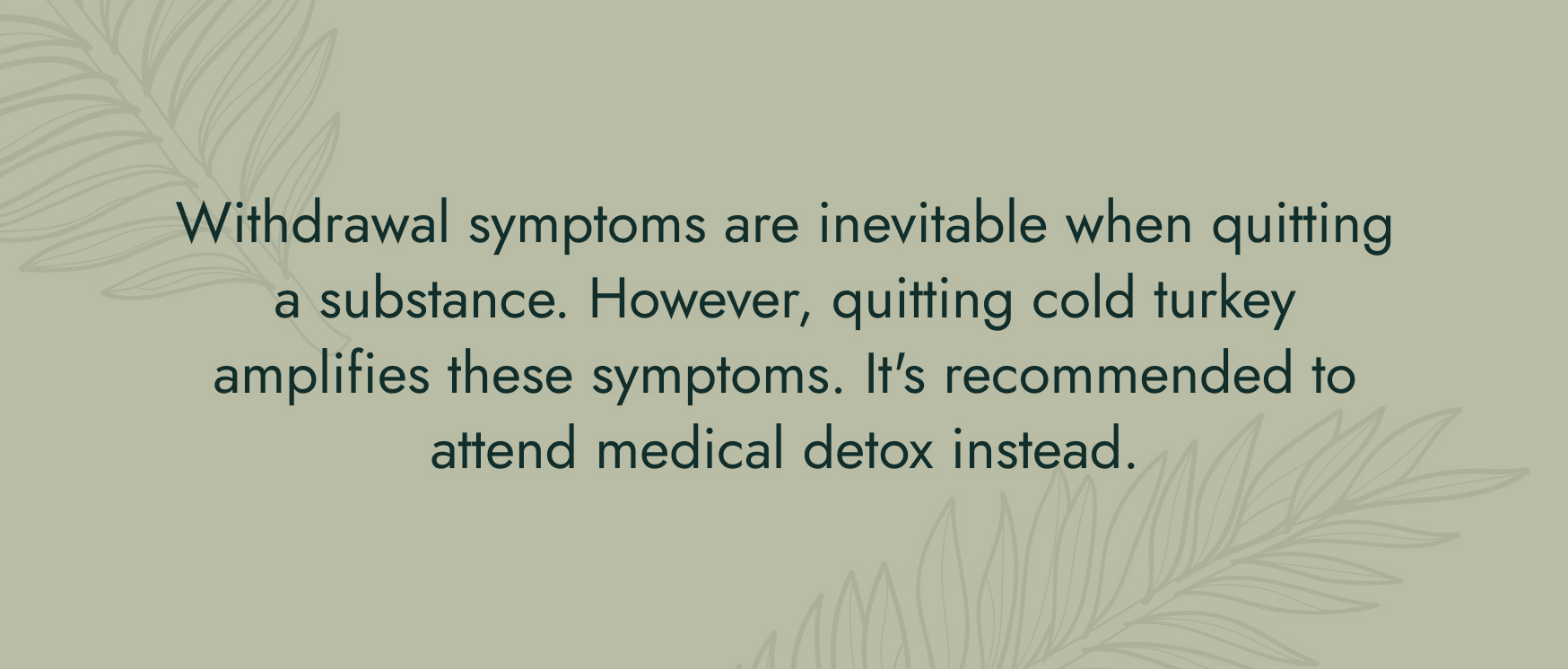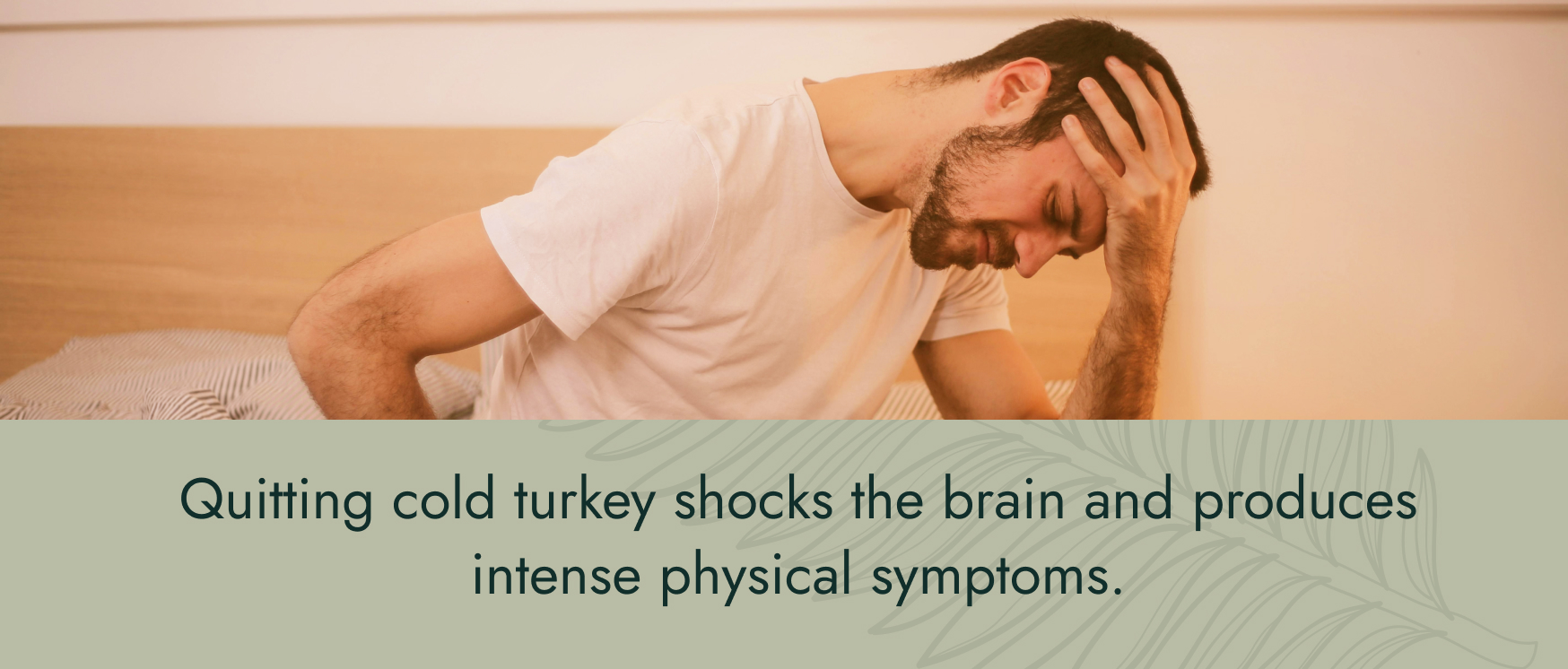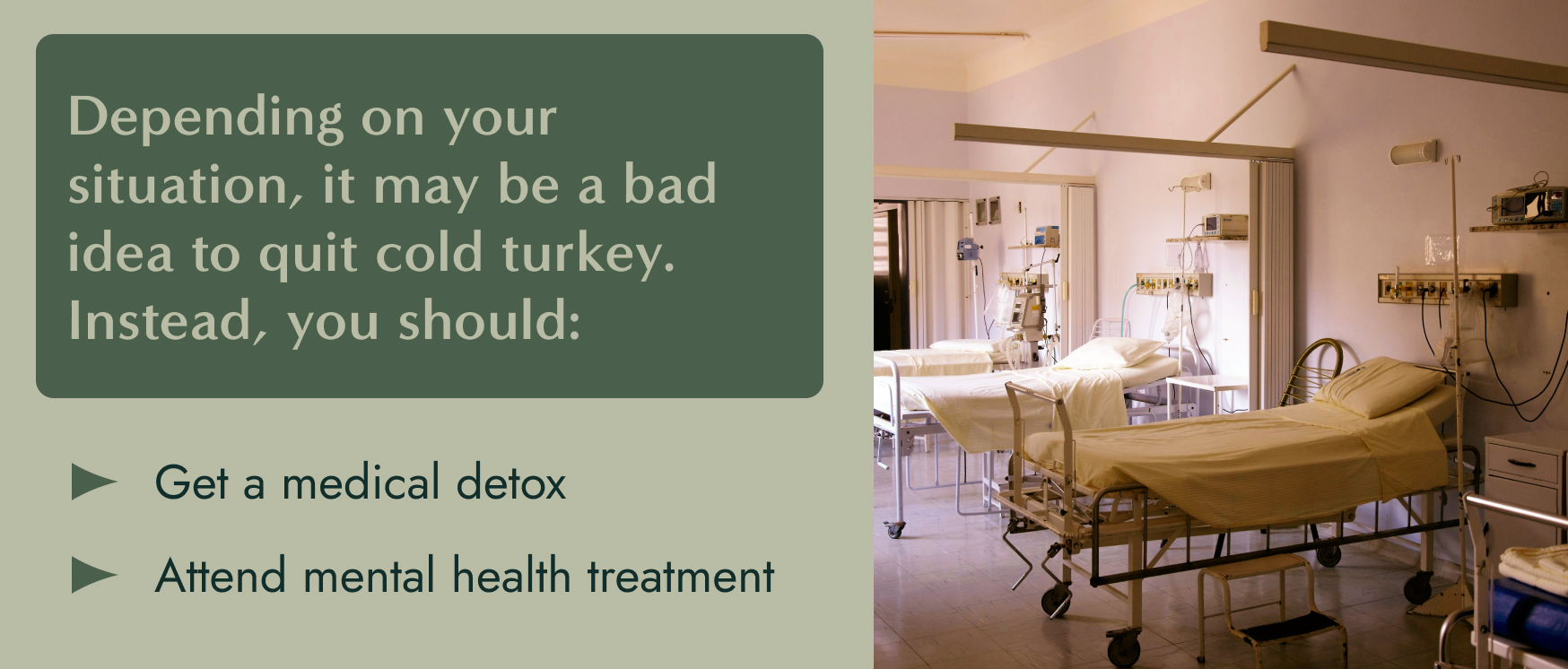Can You Quit Alcohol Cold Turkey?


If you’ve chosen to quit alcohol, you’ve made a very brave decision. It’s important to start the treatment process as soon as possible. You have a long road ahead of you, but with a good plan and the right support, you can find freedom from alcohol dependence.
There are many ways to quit drinking alcohol, but some are better than others. You may be tempted to quit alcohol cold turkey on your own, but there are many dangers associated with that.
In this article, we’ll talk about quitting alcohol cold turkey, including:
- The dangers of withdrawal
- The dangers associated with quitting cold turkey
- How to quit alcohol safely
The Dangers of Withdrawal
One of the big roadblocks to quitting any substance is withdrawal. Withdrawal is a group of symptoms that occurs when someone stops using a substance they are dependent on.
Withdrawal symptoms can vary in severity, but they are all but guaranteed. However, they can be treated with medical attention. These symptoms include
- Insomnia
- Paranoia
- Trembling
- Muscle aches
- Fatigue
- Nausea and vomiting
Quitting cold turkey means stopping consumption without any medical assistance. Doing this can be dangerous as it amplifies withdrawal symptoms.

Treatment for Alcoholism and Alcohol Abuse
The treatment team at Sequoia has extensive experience and resources helping those struggling with alcohol addiction. Learn more about what alcohol use disorder looks like

Dangers of Quitting Alcohol Cold Turkey
Withdrawal symptoms can be dangerous when they go unmanaged. If you plan on quitting cold turkey, consider the risks and dangers associated with that.
Psychological Symptoms
Addiction causes the brain to no longer create the important brain chemicals you need to reach baseline functionality. Instead, the brain relies on alcohol to create those chemicals.
When you quit a substance, your brain needs time to re-adjust to producing those chemicals. Quitting cold turkey means you your brain is starved of those chemicals for a time.
As your brain reacts to the lack of alcohol, psychological symptoms begin:
- Mental fatigue
- Depression
- Irritability
- Mood swings
- Nightmares
- Lower cognitive function
These psychological symptoms are common in withdrawals, but can be treated with close attention from medical professionals.
Sickness & Physical Symptoms
The brain isn’t the only thing negatively affected by quitting cold turkey. The body reacts negatively to withdrawal, as well.
The physical symptoms of quitting cold turkey include:
- Rapid heart rate
- Tremors
- Body aches
- Nausea and vomiting
- Paleness
Depending on the severity of your addiction, these symptoms will be more or less intense. However, they can be lessened with the help of a medically assisted detox.

Seizures
Seizures can occur as quickly as 8 hours after your last drink and even before the blood alcohol level has reached 0%. Most of these are considered major motor seizures and can occur as a single event or a burst of several seizures.
The reason alcohol withdrawal creates these symptoms is due to the way ethanol works in the nervous system and the way the brain builds tolerance.
When alcohol consumption abruptly ends, the changes in the central nervous system become more apparent, and the nervous system gets shocked.
Delirium Tremens
Delirium tremens is the most severe withdrawal symptom and can be fatal. It’s most common in extreme cases of dependence, and it’s the largest danger of quitting alcohol cold turkey.
If your brain is reliant on alcohol and you remove it completely, your brain can jump into this kind of reaction. Symptoms of delirium tremens include:
- Tremors and shakes
- Psychosis
- Confusion
- Heavy sweating
- Agitation or anxiety
- Seizures
- Headaches
- Sensory disorientation
- Nausea and vomiting
- High blood pressure
- Fast heart rate
The only known cause for delirium tremens is withdrawal connected with suddenly ending alcohol consumption. These symptoms are known to appear between 1-3 days after the last drink, but become more intense between 4-5 days.
If you or someone you know may be experiencing delirium tremens, seek medical attention as soon as possible.
Quitting Alcohol Safely
When you stop using a substance your body is used to, you will experience withdrawal. No matter the substance.
Alcohol withdrawal is particularly dangerous due to the potential for delirium tremens. However, with the help of medical professionals and a treatment plan, you can quit alcohol safely.

Medical Detox
Detox is the process of removing harmful chemicals from your body. It’s a vital process for quitting any substance, but especially so for extreme cases of dependence.During a medical detox, you’ll be supervised by medical professionals who use medication and other methods to help you get the alcohol out of your system completely.
This is a critical first step in the recovery process as it brings you back to baseline and provides a safe place to start rebuilding habits and living a life free from alcohol addiction.
Related Blogs

What Happens When You Stop Drinking Alcohol?
Knowing what happens when you quit alcohol can prepare you for recovery. Discover the withdrawal symptoms and long-term benefits of quitting alcohol.

Is Alcohol a Drug?
You can buy alcohol at the grocery store, but does that make it safe? Learn more about what makes alcohol a drug.

5 Signs of High-Functioning Alcoholism
Discover the signs and symptoms of high-functioning alcoholism and how it can be treated.
Mental Health Treatment
After a medical detox, it’s recommended to attend mental health treatment. This can be an inpatient treatment or an intensive outpatient treatment.
During treatment, you’ll work through the root of your addiction and any contributing factors. That includes trauma, negative attachment styles, and other mental health struggles. You’ll also learn about healthier lifestyles and how to implement healthy coping skills.
When choosing a mental health treatment option, consider looking for a center that provides holistic treatment. That means they’ll provide the medical treatment and mental health treatment. They’ll treat the symptoms and the root of the symptoms.
Treatment with Sequoia Behavioral Health
Sequoia Behavioral Health provides holistic treatment for addiction and other major mental and behavioral health struggles. We provide individualized mental health care that helps people manage their symptoms and work through the root of their issues.
Reach out to learn if Sequoia Behavioral Health is the right decision for you.
Learn More
Medication Management
We find the proper medication for our clients through pharmacogenetic testing in order to increase treatment success after a client leaves our facility.
Support Groups
Find the support you need by attending a community support group at Sequoia Behavioral Health.
Psychiatric Care
Medications and therapy are more effective when used together. Sequoia's psychiatry team will make mental health diagnoses and prescribe medications.
Whether you experience inpatient, intensive outpatient, or partial hospitalization programming here at Sequoia, you'll get to experience holistic and integrative treatment. Learn more about our different levels of care.


